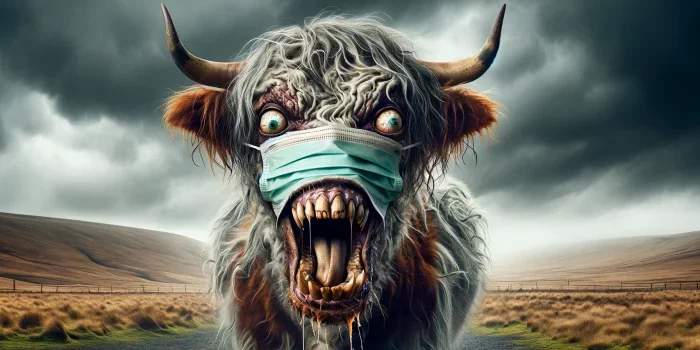(Jacob Bruns, Headline USA) A new livestock-borne virus that has contributed to the surging prices of chicken and eggs, forcing Chick-fil-A to backtrack on its longstanding policy against the use of antibiotics, may now be threatening cows and even humans, raising anxieties about potential food shortages, another pandemic or both.
The so-called super bird flu was previously detected in cattle in three states: Texas, Michigan and Kansas. Now, three more states are reporting cases in their own livestock as the virus spreads, Legal Insurrection reported.
The virus, known as H5N1, has now been detected in relatively small numbers of cows in Idaho, New Mexico and Ohio, each of which are monitoring the situation according to the report.
In New Mexico, no numbers were available as officials tried to track down which herds had and had not been infected by the virus. New Mexico State Veterinarian Samantha Uhrig said that officials were working to isolate afflicted herds.
“We don’t have an actual count of the cows individually,” said Uhrig. “We have a number of herds that have been confirmed.”
Though the disease, H5N1, causes cows to behave strangely and get sick for some time, most healthy animals survive the ordeal according to the report.
Humans can also contract H5N1, as can house cats.
On Wednesday, the European Food Safety Authority sounded the alarm over a potential spread to humans, which could create pandemic-like situations due to a lack of natural immunity, Fox News reported.
“These viruses continue to evolve globally, and with the migration of wild birds, new strains carrying potential mutations for mammalian adaptation could be selected,” noted the EFSA alert.
“If avian A (H5N1) influenza viruses acquire the ability to spread efficiently among humans, large‐scale transmission could occur due to the lack of immune defenses against H5 viruses in humans,” it added.
More concerning yet was a recent report suggesting that the U.S. Department of Agriculture may be performing gain-of-function research in collaboration with Chinese scientists that would make the bird flu even more infectious and deadly, the Daily Mail reported.
“It’s reckless and indefensible for… bureaucrats to bankroll dangerous avian flu gain-of-function studies involving virus experimenters from the notorious Wuhan animal lab that likely caused COVID and its CCP-run parent organization, the Chinese Academy of Sciences,” said Justin Goodman, senior vice president of the White Coat Waste Project, which exposed the $1 million research program.
‘Taxpayers shouldn’t be forced to foot the bill for animal experiments with foreign adversaries that soup up viruses and can cause pandemics or create bioweapons.’
A recent Smithsonian magazine report about H5N1 suggested that livestock contracted the disease by way of exposure to sick birds. Humans then could contract the disease by way of exposure to sick livestock.
In this instance, a Texas man who works with livestock was confirmed on Monday to have come down with H5N1, Time magazine reported, but he was said to be recovering well.
According to Nirav Shah, the principal deputy director of the Centers for Disease Control and Prevention, none of the patient’s contacts appeared to have contracted the disease from him.
“We are not aware of reports that any of this individual’s close contacts have developed any symptoms,” Shah wrote.
“The fact that there are not other samples cooking right now is reassuring, insofar as that we’re not aware of other individuals who are symptomatic following an exposure to livestock.”
In response to the situation, the CDC put out a press release, claiming that the outbreak would not affect mass-produced milk prices, though some are worried that it might provide pretext for further raids on small-time dairy operations.
“The cattle infections do not present a concern for the commercial milk supply,” the CDC wrote. “Dairies are required to destroy or divert milk from any sick cows, plus pasteurization kills avian flu viruses.”
It remained to be determined what impact it might otherwise have on the beef and poultry industries, which inflation already has made, in many ways, unsustainable, with a tumultuous summer in store for gas prices and other economic factors likewise suggesting that shortages could lead to further price hikes.

